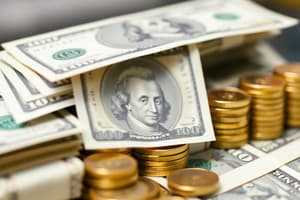Podcast
Questions and Answers
What is the primary difference between the definitions of M2 and M3?
What is the primary difference between the definitions of M2 and M3?
- M3 includes savings deposits of post office savings banks, while M2 does not (correct)
- M2 includes currency with the public, while M3 does not
- M2 includes time deposits with the banking system, while M3 does not
- M3 includes currency with the public, while M2 does not
What is excluded from the definition of 'public' in the context of money supply?
What is excluded from the definition of 'public' in the context of money supply?
- Local authorities and non-banking financial institutions
- Foreign central banks and governments
- Households and firms
- The government and the banking system (correct)
What type of deposits are included in the definition of M1?
What type of deposits are included in the definition of M1?
- Demand deposits with the banking system (correct)
- Money market fund shares and debt securities
- Savings deposits and repurchase agreements
- Demand deposits and time deposits
Which of the following is NOT included in the definition of broad money (M3)?
Which of the following is NOT included in the definition of broad money (M3)?
Which institution is included in the definition of 'banking system'?
Which institution is included in the definition of 'banking system'?
What is the primary difference between demand deposits and time deposits?
What is the primary difference between demand deposits and time deposits?
What happens to excess reserves when banks expect an increase in deposit outflows?
What happens to excess reserves when banks expect an increase in deposit outflows?
What is the primary reason for the decline in excess reserves when expected deposit outflows decrease?
What is the primary reason for the decline in excess reserves when expected deposit outflows decrease?
What is the effect of banks converting deposits into currency on the creation of credit money?
What is the effect of banks converting deposits into currency on the creation of credit money?
What is the primary reason for the sharp deceleration in monetary growth during times of financial crises?
What is the primary reason for the sharp deceleration in monetary growth during times of financial crises?
What is the effect of a decline in expected deposit outflows on the monetary base?
What is the effect of a decline in expected deposit outflows on the monetary base?
What is the primary reason for the variation in money supply over time?
What is the primary reason for the variation in money supply over time?
What is the primary reason why the money multiplier and the deposit multiplier are not identical?
What is the primary reason why the money multiplier and the deposit multiplier are not identical?
What happens to excess reserves when banks are risk averse to lending?
What happens to excess reserves when banks are risk averse to lending?
What is the outcome when banks create money through credit?
What is the outcome when banks create money through credit?
What is the relationship between the type of money created by commercial banks and that issued by the central bank?
What is the relationship between the type of money created by commercial banks and that issued by the central bank?
What happened to the average deposit of funds in the overnight reverse repo window in India during the COVID pandemic?
What happened to the average deposit of funds in the overnight reverse repo window in India during the COVID pandemic?
What is the primary reason why banks maintain reserves above the minimum required reserve?
What is the primary reason why banks maintain reserves above the minimum required reserve?
Flashcards are hidden until you start studying




